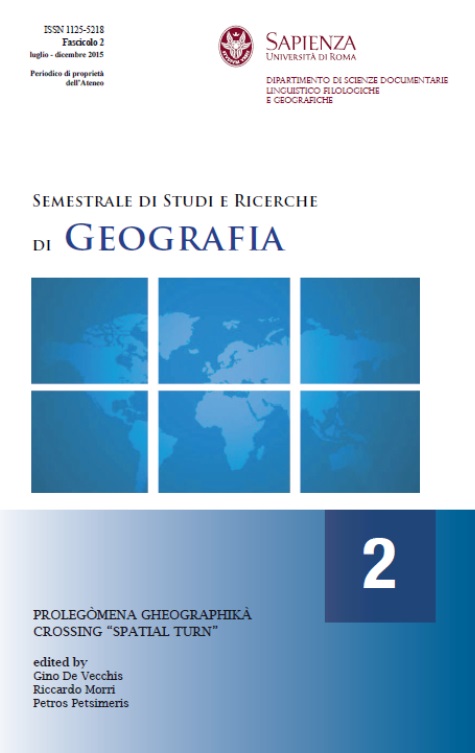Lo spatial turn come figura epistemologica. Una meditazione a partire dalla geografia politica della modernità
DOI :
https://doi.org/10.13133/1125-5218.15088Résumé
The spatial turn as epistemological figure. A consideration from the political geography of modernityTaking on the spatial turn as an interpretive category of Geography, we show the epistemological nature and, consequently, the relevance in the historical evolution of thought and disciplinary practice. The main focus of our reflection is the passage of the Political Geography from the Middle Ages to the Renaissance, identifying in the spatial turn a regressive process in the organization of this ancient form of knowledge. The scene involves great personalities, from Botero to Montesquieu, from Machiavelli to Voltaire, from Hobbes to Kant. But the representation also takes in consideration the interpreters, namely who have accepted and validated the contents of a political geography of modernity. Finally it imposes the need for a reflexive epistemology in defining and continuously updating the status of ideological and cognitive knowledge foundation of Western scientific tradition.
Le tournant spatial comme figure epistemologique. Meditation a partir de la geographie politique de la modernite
En assumant le tournant spatial comme une catégorie interpretative de la Géographie, nous en montrons la nature épistémoligique et, par reflex, la pertinence dans l’évolution historique de la pensée et de la pratique disciplinaire. Le point crucial de notre méditation c’est le passage de la Géographie Politique du Moyen Âge à la Renaissance, en ciblant le spatial turn comme un processus regressif dans l’organisation de cette forme de savoir, pourtant si ancienne. Bien sûr, on voit une scene comblée de personnages importants: de Botero à Montesquieu, de Machiavelli à Voltaire, de Hobbes à Kant. Purtant, la représentation convoque non seulement les grands protagonistes mais aussi les interprètes: ceux qui ont credité – et en quelques
sortes officialisé – les contenus de la Géographie Politique de la modernité. L’exigence s’affirme ainsi d’une épistémologie réflexive pour definir et perenniser la mise à jour du statut idéologique et cognitif d’une connaissance fondationnelle de la tradition scientifique occidentale.
Téléchargements
Publiée
Numéro
Rubrique
Licence
Gli autori che pubblicano su questa rivista accettano le seguenti condizioni:- Gli autori mantengono i diritti sulla loro opera e cedono alla rivista il diritto di prima pubblicazione dell'opera, contemporaneamente licenziata sotto una Licenza Creative Commons - Attribuzione che permette ad altri di condividere l'opera indicando la paternità intellettuale e la prima pubblicazione su questa rivista.
- Gli autori possono aderire ad altri accordi di licenza non esclusiva per la distribuzione della versione dell'opera pubblicata (es. depositarla in un archivio istituzionale o pubblicarla in una monografia), a patto di indicare che la prima pubblicazione è avvenuta su questa rivista.
- Gli autori possono diffondere la loro opera online (es. in repository istituzionali o nel loro sito web) prima e durante il processo di submission, poiché può portare a scambi produttivi e aumentare le citazioni dell'opera pubblicata (Vedi The Effect of Open Access).


